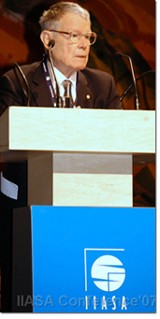The Nobel Prize, IIASA, and Thomas Schelling
He is the fourth Nobel Prize Laureate to have worked at IIASA. A thoughtful, articulate, and often original thinker, Professor Schelling was one of the first to apply the ideas of game theory to international relations. In his classic book, The Strategy of Conflict (1960), he showed that even the deadliest conflicts involved essentials of common interest and cooperation between enemies.
At a time of emerging nuclear parity between the United States and the Soviet Union, Schelling’s work was enormously influential. Schelling provided the theoretical basis for the strategy of nuclear deterrence— using the threat of nuclear attack as an instrument of political influence to actually prevent a nuclear attack—which, according to the Nobel Prize Committee, “proved of great relevance for conflict resolution and efforts to avoid war.” Indeed, the resulting nuclear face-off endured till the end of the Cold War.
Professor Schelling also used game theory to develop an explanation of why segregation occurs and, more recently, on building coalitions for climate change. “Tom’s talent was asking questions that go to the core of scientific and policy issues,” said IIASA research program leader, Joanne Bayer, who worked with the Laureate on various projects. “For example: Is it worth the trillions of Euros necessary to abate climate change in the future, when these funds could be used to help eradicate poverty today?”
Of IIASA, he says: “By attracting the best scientists from around the world, IIASA is transforming our understanding of our changing world. And by bringing the world’s most promising young students to spend a summer at IIASA, the Institute ensures the next generation of scientists is even better equipped to solve the world’s problems.”
More information


